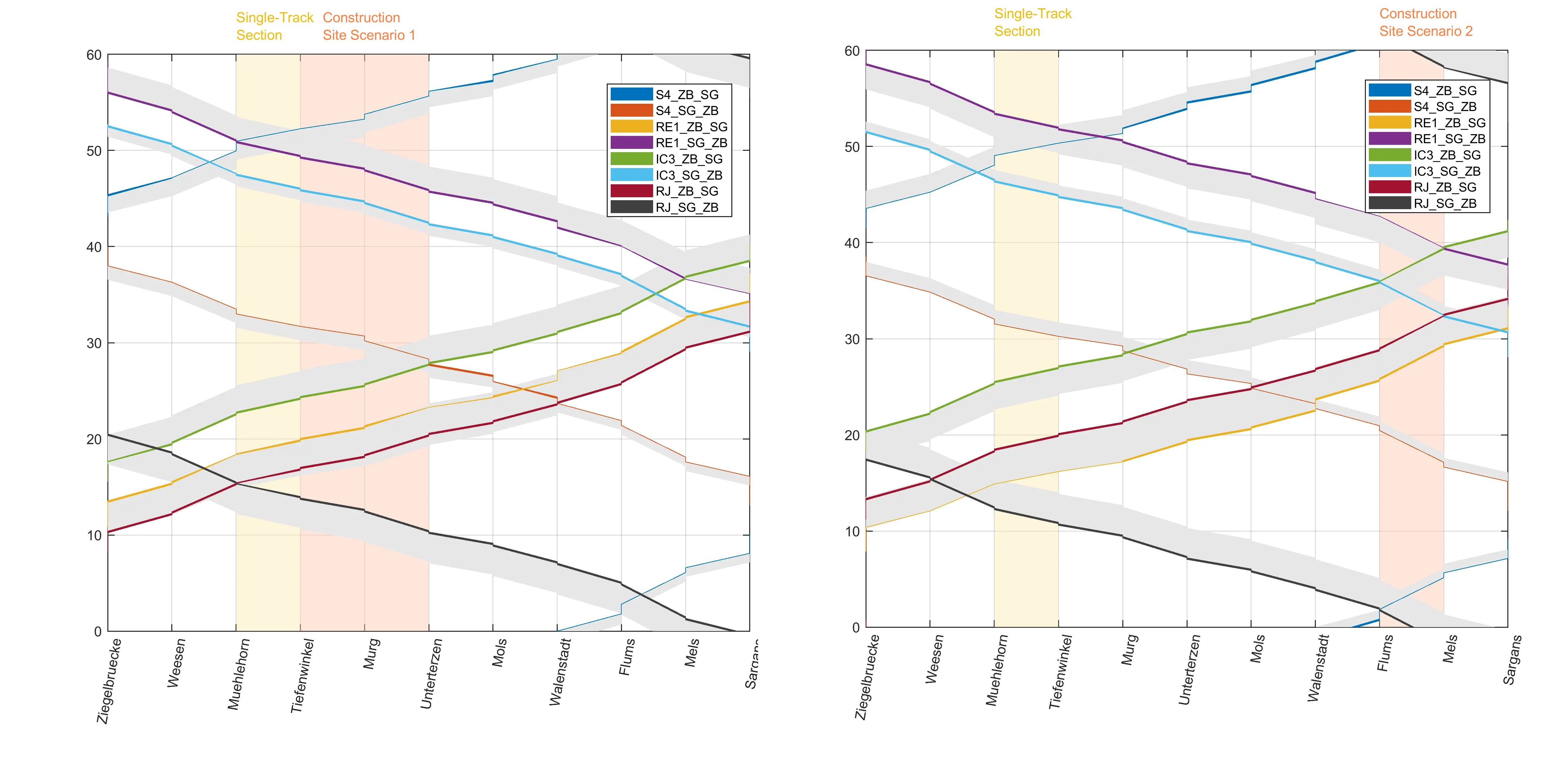SBB-Research Funds 'Automated Timetable Planning'
Development of a prototype for the automated generation of timetable scenarios specified by the transport service intention
Description
Within the next 5 to 10 years, public transport in Switzerland as well as in other European countries will experience major technological and organisational changes. However, changes will also take place on the customer side, resulting in different mobility behaviour and demand patterns. These changes will lead to additional challenges for transport service providers in private as well as public domains. Time to market will be a key success factor and it is unnecessary to mention that due to these factors the speed and flexibility of business processes in freight as well as in passenger transport industry have to be increased significantly.Within the railway value chain (line planning, timetabling and vehicle scheduling etc.) the coordina-tion of the individual planning steps is a key success factor. SBB as the leading service provider in public transport in Switzerland has recognized this challenge and, together with various partners, initiated the strategic project Smart Rail 4.0. The ZHAW and especially the Institute for Data Analysis and Process Design (IDP) of the School of Engineering wants to be part of this transformation pro-cess and to contribute with research and educational activities. The IDP research therefore aims for the transformation of academic and scientific know-how to practical applicability. In a first step this concerns directly the current Smart Rail 4.0 TMS-PAS project activities, that concentrate on timeta-bling issues.The IDP project team considers the integration of the line planning and the timetabling process as crucial for practical applications. To address this in the current research project, we present an appli-cation concept that enables the integration of these two major process steps in the transport service value-chain. Although it turns out from our research, that the technical requirements for the integra-tion of the process can be satisfied, rules and conditions for a closer cooperation of the involved business units, the train operating companies and the infrastructure operating company, have to be improved and to be worked out in more detail.In addition to a detailed application concept with use cases for the timetabling process we propose a methodology for computer aided timetable generation based on the central planning object known as ‘service intention’. The service intention can be used to iteratively develop the timetable relying on a ‘progressive feasibility assessment’, a feature that is requested in practice.Our proposed model is based on the ‘track-choice’ and line rotation extension of the commonly known method for the generation of periodic event schedules ‘PESP’. The extension makes use of the track infrastructure representation which is also used in the line planning and timetabling system Viriato. This system that is widely used by public transport planners and operators. With the help of Viriato, it is rather easy to configure the timetabling problem in sufficient detail. On the other side, the level of detail of the considered data is light enough to algorithmically solve practical timetabling problems of realistic sizes.Taking into consideration the technical and operational constraints given by rolling stock, station and track topology data on one hand, and the commercial requirements defined by a given line concept on the other, the method presented generates periodic timetables including train-track assignments. In the first step, the standardized data structure ‘service intention’ represents the line concept con-sisting of train paths and frequencies. Due to the utilization of infrastructure-based track capacities, we are also able to assess the feasibility of the line concept given. Additionally, the method allows for handling temporary resource restrictions (e.g. caused by construction sites or operational disturb-ances). In order to assess the performance of the resulting timetable we present a framework for performance measurement that addresses the customer convenience (in terms of start-to-end travel time) as well as operational stability requirements (in terms of delay sensitivity and critical relations).
Key Data
Projectlead
Prof. Dr. Reimond Matthias Wüst
Co-Projectlead
Project team
Severin Ess, Claudio Gomez
Project status
completed, 09/2017 - 10/2018
Funding partner
Schweizerische Bundesbahnen SBB / SBB-Forschungsfonds
Project budget
12'000 CHF
Publications
-
Improvement of maintenance timetable stability based on iteratively assigning event flexibility in FPESP
2019 Wüst, Raimond; Bütikofer, Stephan; Ess, Severin; Gomez, Claudio; Steiner, Albert; Laumanns, Marco; Szabo, Jacint
-
Periodic timetabling with ‘Track Choice’-PESP based on given line concepts and mesoscopic infrastructure
2019 Wüst, Raimond; Bütikofer, Stephan; Ess, Severin; Gomez, Claudio; Steiner, Albert; Laumanns, Marco; Szabo, Jacint
-
Improvement of maintenance timetable stability based on iteratively assigning event flexibility in FPESP
2019 Wüst, Raimond Matthias; Bütikofer, Stephan; Ess, Severin; Gomez, Claudio; Steiner, Albert; Laumanns, Marco; Szabo, Jacint
-
Periodic timetabling with flexibility based on a mesoscopic topology
2019 Bütikofer, Stephan; Wüst, Raimond Matthias; Ess, Severin
-
Automatisierte Linienplanung im öffentlichen Verkehr
2019 Bütikofer, Stephan; Köchli, Joël; Frick, Kevin; Weber, Christoph
-
Development of a prototype for the automated generation of timetable scenarios specified by the transport service intention
2018 Wüst, Raimond; Gomez, Claudio; Ess, Severin; Steiner, Albert; Bütikofer, Stephan
-
Periodic timetabling with ‘Track Choice’-PESP based on given line concepts and mesoscopic infrastructure
2018 Wüst, Raimond Matthias; Gomez, Claudio; Ess, Severin; Steiner, Albert; Bütikofer, Stephan; Laumanns, Marco; Szabo, Jazint
-
Periodic timetabling with ‘Track Choice’-PESP based on given line concepts and mesoscopic infrastructure
2018 Bütikofer, Stephan; Wüst, Raimond Matthias; Steiner, Albert
